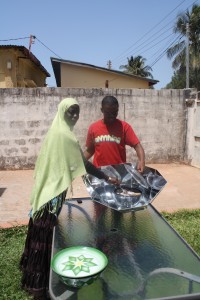
Afterthought for Some, Daily Struggle for Others
Our busy modern lives—reliant on easily available meals and a steady flow of electricity and gas for light and comfortable temperatures—allow us little chance to ponder the origins of the resources we consume for our daily needs.

Solar cookers provide an easy, less fuel intensive, and environmentally sound way to prepare food. (Photo credit: Izaak Van Melle)
Now imagine spending up to four hours a day gathering those resources, and that consuming them for your daily needs emitted toxic smoke directly into your home, endangering the health of you and your family.
This is the reality for more than half of the people in the world who burn wood and other biomass—including charcoal, agricultural waste, and animal dung—for cooking, boiling water, lighting, and heating. Those with limited resource options are in need of simple, clean, and inexpensive alternatives, like solar cookers, to help them meet their most basic needs.
Inhaling smoke from open fires and traditional stoves in poorly ventilated houses and other indoor environments kills 1.6 million people every year. The upper respiratory diseases caused by inhaling open fire smoke are the biggest killers of children under 5 years old in the developing world. The smoke also contributes to respiratory infection, glaucoma, lung cancer, and other debilitating health conditions. Collecting biomass spurs deforestation and consumes time—time that could be spent in school or earning much needed income. Poor health, environmental degradation, lack of education, and insufficient incomes are among the root causes of poverty.
If aid agencies and policy makers are going to break the cycle of poverty, practical solutions to these root causes will need to be made accessible to the world’s poorest people. Secretary of State Hillary Clinton announced in September that the Global Alliance for Clean Cookstoves will be committing over $50 million to create a thriving global market for clean and efficient stoves. The initiative aims for 100 million homes to adopt clean stoves and fuels by 2020. Reaching that target will not only reduce deaths and conserve resources, it will help create local jobs and create a market that will increase the availability—and bring down the cost—of clean stoves for the three billion people around the world who need them.
One initiative highlighted is that of Solar Household Energy, Inc. (SHE), based in Chevy Chase, Maryland. SHE is making solar cookers available throughout several countries in Africa and Latin America. The solar cookers—which do not require any fuel besides the rays of the sun—can bake and stew food. SHE gives trainings and demonstrations at the village level, replicating local dishes to ensure that cookers are used properly and accepted culturally. Although the technology cannot entirely replace traditional fuels, it can significantly reduce their use, adding quality of life and alleviating environmental stress.
Even with billions of dollars spent in aid money every year, the infrastructure that we rely on and take for granted in the U.S. is still far out of reach for the world’s poorest families. Investing in these families by making simple, low-cost solutions to their daily struggles more accessible can help break the cycle of poverty. Opportunities to improve health, education, and income can pave the way to improving quality of life.
As our own modern lifestyles both consume our time and afford us the luxury of taking our basic needs for granted, we must take steps to extend that luxury to the other half. It’s simple. It’s affordable. It’s possible!
Matt Styslinger is a research intern with the Nourishing the Planet project.
To purchase your own copy of State of the World 2011: Innovations that Nourish the Planet, please click HERE. And to watch the one minute book trailer, click HERE.
Article printed from Nourishing the Planet.
URL to article: http://blogs.worldwatch.org/nourishingtheplanet/afterthought-for-some-daily-struggle-for-others-solar-energy-cooker-environment-fuel/
Copyright © 2011 Nourishing the Planet. All rights reserved.



